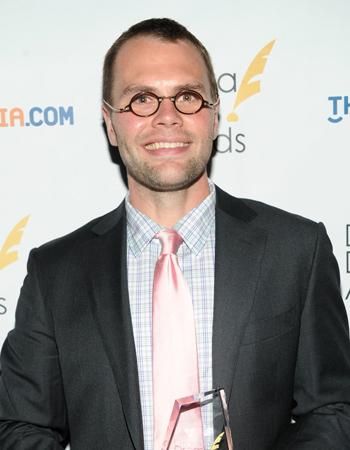

The movement of the play is that it starts in this tiny, quotidian way, and it grows and grows and grows in an effort to meet that title. I think the audience is just sort of like, wow, where are we going? What is this? What is the fundamental concern of this play? I don’t know if the play would fundamentally work without that title. And the mortgage isn’t a metaphor they’re just talking about mortgages. Because I thought, maybe the movement of this play is: It has this title that could not be more grandiose, it’s as big as a cathedral, and then you walk in and there are two guys sitting in a cubicle talking about mortgages for a really long time. And the only thing that made me think, maybe this is a play, is when I came up with the title.

I had this initial idea of two guys in a cubicle who don’t stand up. When I first started writing it, I was like, I don’t know if this is a play. So the play is about these systems that we all have to enter into in order to live as American people if we’re not hyper-wealthy, systems that are incredibly Byzantine and overworked, and it just seems like they’re getting worse. But it was so incredibly complicated and so hard. It just came from the sense of: These middle-class, normal things of having a family and owning an apartment don’t sound like they should be some of the hardest things you’ve ever endeavored to do these should be sort of normal American things. The very clear starting point was that we adopted a kid, right after we had a horrifically hard time buying this apartment. SAM HUNTER: I wrote the play before the pandemic. Where did this play come from and what’s that title about? ROB WEINERT-KENDT: I have to start with the title, and how that relates to what we see onstage, which is not a lecture or a sermon, thank God. I spoke to Sam earlier this week via Zoom he lives in Inwood, on the north end of Manhattan, with his husband, dramaturg John Baker, and their daughter. A Case for the Existence of God, though inarguably smaller in scale, is no less theatrically ambitious in its own lane, with sharp, attuned direction by David Cromer. Hunter’s previous play, Greater Clements (which American Theatre was proud to publish in its last print issue to date) was a sprawling tragedy worth of O’Neill, given a suitably grand staging at Lincoln Center Theater by Hunter’s longtime collaborator, director Davis McCallum. That last bit has been Hunter’s enduring setting and subject-or perhaps it would be more accurate to say that small-town Idaho, where he was raised and maintains ties, has been the lens through which he’s taken the measure of the human soul, or a vein he’s mined for remarkable beauty, terror, and humor. And they are not there to debate theology but to wrestle over mortgage lending, single parenting, and life in declining small-town America. The play is a departure for Hunter in other ways: It has his smallest cast yet, just two actors on a single set (expertly designed by Arnulfo Maldonado).

For his newest play, now at New York’s Signature Theatre as part of a five-year residency there, Hunter has gone a different route, choosing the stark, provocative title A Case for the Existence of God, which sounds like something you might see at an airport bookstore, or perhaps in a Tony Kushner subtitle.

Hunter, you typically either get a place name to ground the action ( Lewiston/Clarkston, Pocatello, Greater Clements, A Bright New Boise), or gnomic, suggestive nouns that hint at grander themes: The Few, The Harvest, The Whale, A Permanent Image. What’s in a title? With plays by the prolific Samuel D.


 0 kommentar(er)
0 kommentar(er)
